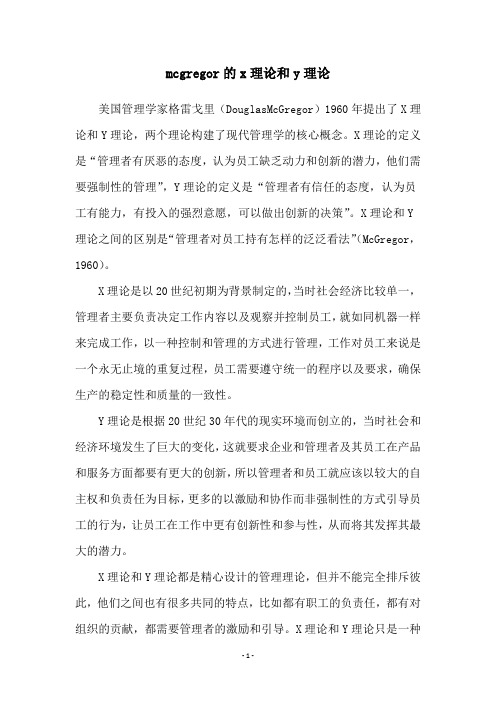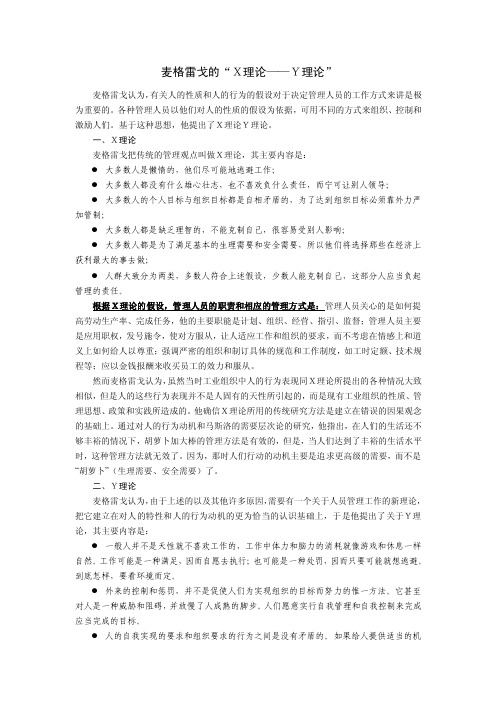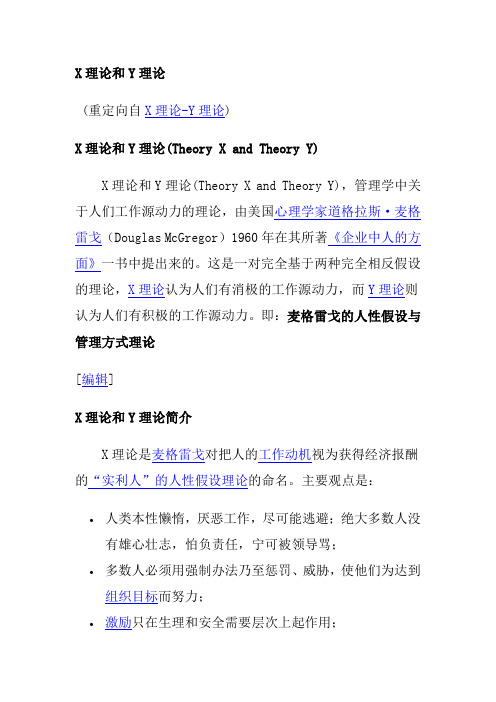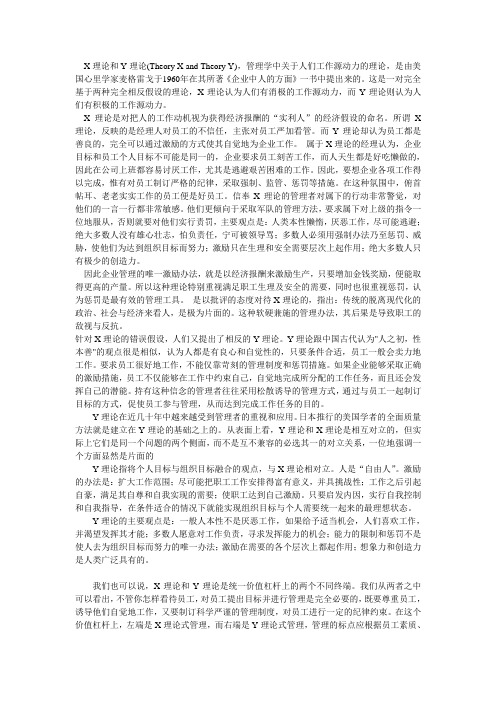管理中的X理论和Y理论
mcgregor的x理论和y理论

mcgregor的x理论和y理论美国管理学家格雷戈里(DouglasMcGregor)1960年提出了X理论和Y理论,两个理论构建了现代管理学的核心概念。
X理论的定义是“管理者有厌恶的态度,认为员工缺乏动力和创新的潜力,他们需要强制性的管理”,Y理论的定义是“管理者有信任的态度,认为员工有能力,有投入的强烈意愿,可以做出创新的决策”。
X理论和Y 理论之间的区别是“管理者对员工持有怎样的泛泛看法”(McGregor,1960)。
X理论是以20世纪初期为背景制定的,当时社会经济比较单一,管理者主要负责决定工作内容以及观察并控制员工,就如同机器一样来完成工作,以一种控制和管理的方式进行管理,工作对员工来说是一个永无止境的重复过程,员工需要遵守统一的程序以及要求,确保生产的稳定性和质量的一致性。
Y理论是根据20世纪30年代的现实环境而创立的,当时社会和经济环境发生了巨大的变化,这就要求企业和管理者及其员工在产品和服务方面都要有更大的创新,所以管理者和员工就应该以较大的自主权和负责任为目标,更多的以激励和协作而非强制性的方式引导员工的行为,让员工在工作中更有创新性和参与性,从而将其发挥其最大的潜力。
X理论和Y理论都是精心设计的管理理论,但并不能完全排斥彼此,他们之间也有很多共同的特点,比如都有职工的负责任,都有对组织的贡献,都需要管理者的激励和引导。
X理论和Y理论只是一种指导思想,而不是绝对正确,面对不同的时代背景,管理者需要根据具体的环境和情况从中选择最合适的理论,根据不同的管理能力以及口头沟通和文字沟通的不同,从而领导和管理员工,实现激励和积极参与,凝聚团队力量,让组织变得更加有效率和成功。
综上所述,X理论和Y理论都是一种有意义的管理理论,管理者也应该根据实际情况,从中选择最合适的理论,以激励和引导员工,让组织变得更加有效率和成功。
x理论y理论的实施步骤

x理论y理论的实施步骤1. 背景介绍在组织管理中,x理论和y理论是两种不同的管理理论,用于解释员工劳动动机和管理风格。
x理论认为员工天生懒惰,只有通过严格监管才能发挥他们的工作动力;而y理论则认为员工具备自我驱动的能力,并提倡参与式的管理风格。
本文将介绍x理论和y理论的实施步骤。
2. x理论的实施步骤下面是x理论的实施步骤:•步骤一:建立明确的工作目标–确定组织的长期和短期目标–将目标分解为具体的工作任务•步骤二:制定绩效评估指标–设计评估体系,确定员工工作绩效的评估标准–建立有效的绩效评估机制,包括定期评估会议和绩效考核工具•步骤三:建立严格的监管机制–设立监管岗位,负责对员工的工作进行监督和管理–建立监管制度和规范,确保员工按照规定的流程和标准执行工作•步骤四:提供必要的培训和支持–为员工提供必要的培训,提升他们的工作能力和技能–提供必要的支持和资源,确保员工能够顺利完成工作任务虽然x理论在一定程度上可以激发员工的工作动力,但它也存在一些问题。
员工可能感觉被过度监管,缺乏自主性和创造性。
因此,组织在实施x理论时也应考虑合理的灵活性,避免过度控制和限制。
3. y理论的实施步骤下面是y理论的实施步骤:•步骤一:建立积极的工作环境–创建一个支持员工发展和成长的工作环境–提供员工参与决策的机会,让他们感受到被重视和认可•步骤二:激发员工的自我驱动力–提供具有挑战性和意义的工作任务–鼓励员工主动寻求学习和发展机会•步骤三:建立开放的沟通渠道–鼓励员工表达意见和想法,建立良好的沟通氛围–建立定期反馈机制,及时回馈员工的工作表现和发展方向•步骤四:提供发展和晋升机会–为员工制定明确的职业发展路径–提供培训和学习机会,帮助员工提升能力和技能,实现个人的职业目标y理论强调员工的参与和自主性,能够激发员工的内在动力和创造力。
但在实施y理论时,也要注意平衡员工自主和组织目标的关系,确保员工的自主性不会影响到整个团队的协作和效率。
管理学三大理论XY理论

美国管理学家麦格雷戈()于1957年提出了理论。
麦格雷戈把传统管理学成为“X理论”,他自己的管理学说称为“Y理论”。
X理论认为:多数人天生懒惰,尽一切可能逃避工作;多数人没有抱负,宁愿被领导、怕负责任,视个人安全高于一切;对多数人必须采取强迫命令,软硬兼施的管理措施。
Y理论的看法则相反,它认为,一般人并不天生厌恶工作,多数人愿意对工作负责,并有相当程度的想象力和创造才能;控制和惩罚不是使人实现企业目标的唯一办法,还可以通过满足职工爱的需要、尊重的需要和自我实现的需要,使个人和组织目标融合一致,达到提高生产率的目的。
麦格雷戈认为,人的行为表现并非固有的天性决定的,而是企业中的管理实践造成的。
剥夺人的生理需要,会使人生病。
同样,剥夺人的较高级的需要,如感情上的需要、地位的需要、自我实现的需要,也会使人产生病态的行为。
人们之所以会产生那种消极的、敌对的和拒绝承担责任的态度,正是由于他们被剥夺了社会需要和自我实现的需要而产生的疾病的症状。
因而迫切需要一种新的,建立在对人的特性和人的行为动机更为恰当的认识基础上的新理论。
麦格雷戈强调指出,必须充分肯定作为企业生产主体的人,企业职工的积极性是处于主导地位的,他们乐于工作、勇于承担责任,并且多数人都具有解决问题的想象力、独创性和创造力,关键在于管理方面如何将职工的这种潜能和积极性充分发挥出来。
<<管理学原理>>中现代管理的三大理论是什么?是系统理论、权变理论和决策理论系统理论在管理学的研究中运用系统思想,并非开始于管理的系统学派。
社会系统学派的代表人物巴纳德最早提出了协作系统的概念,并指出管理的职能就在于保持组织同外部环境的平衡。
在本世纪30年代,福莱特也明确地提出了管理的整体性思想,她把企业组织视为一个不断运动着的统一整体,指出管理必须着眼于整体内部的协调。
此后,管理科学学派也把系统分析作为一种基本方法用于解决某些工程项目的规划和复杂管理问题的决策。
麦格雷戈的“X理论——Y理论”

麦格雷戈的“X理论——Y理论”麦格雷戈认为,有关人的性质和人的行为的假设对于决定管理人员的工作方式来讲是极为重要的。
各种管理人员以他们对人的性质的假设为依据,可用不同的方式来组织、控制和激励人们。
基于这种思想,他提出了X理论Y理论。
一、X理论麦格雷戈把传统的管理观点叫做X理论,其主要内容是:●大多数人是懒惰的,他们尽可能地逃避工作;●大多数人都没有什么雄心壮志,也不喜欢负什么责任,而宁可让别人领导;●大多数人的个人目标与组织目标都是自相矛盾的,为了达到组织目标必须靠外力严加管制;●大多数人都是缺乏理智的,不能克制自己,很容易受别人影响;●大多数人都是为了满足基本的生理需要和安全需要,所以他们将选择那些在经济上获利最大的事去做;●人群大致分为两类,多数人符合上述假设,少数人能克制自己,这部分人应当负起管理的责任。
根据X理论的假设,管理人员的职责和相应的管理方式是:管理人员关心的是如何提高劳动生产率、完成任务,他的主要职能是计划、组织、经营、指引、监督;管理人员主要是应用职权,发号施令,使对方服从,让人适应工作和组织的要求,而不考虑在情感上和道义上如何给人以尊重;强调严密的组织和制订具体的规范和工作制度,如工时定额、技术规程等;应以金钱报酬来收买员工的效力和服从。
然而麦格雷戈认为,虽然当时工业组织中人的行为表现同X理论所提出的各种情况大致相似,但是人的这些行为表现并不是人固有的天性所引起的,而是现有工业组织的性质、管理思想、政策和实践所造成的。
他确信X理论所用的传统研究方法是建立在错误的因果观念的基础上。
通过对人的行为动机和马斯洛的需要层次论的研究,他指出,在人们的生活还不够丰裕的情况下,胡萝卜加大棒的管理方法是有效的,但是,当人们达到了丰裕的生活水平时,这种管理方法就无效了。
因为,那时人们行动的动机主要是追求更高级的需要,而不是“胡萝卜”(生理需要、安全需要)了。
二、Y理论麦格雷戈认为,由于上述的以及其他许多原因,需要有一个关于人员管理工作的新理论,把它建立在对人的特性和人的行为动机的更为恰当的认识基础上,于是他提出了关于Y理论,其主要内容是:●一般人并不是天性就不喜欢工作的,工作中体力和脑力的消耗就像游戏和休息一样自然。
X理论和Y理论

X理论和Y理论(重定向自X理论-Y理论)X理论和Y理论(Theory X and Theory Y)X理论和Y理论(Theory X and Theory Y),管理学中关于人们工作源动力的理论,由美国心理学家道格拉斯·麦格雷戈(Douglas McGregor)1960年在其所著《企业中人的方面》一书中提出来的。
这是一对完全基于两种完全相反假设的理论,X理论认为人们有消极的工作源动力,而Y理论则认为人们有积极的工作源动力。
即:麦格雷戈的人性假设与管理方式理论[编辑]X理论和Y理论简介X理论是麦格雷戈对把人的工作动机视为获得经济报酬的“实利人”的人性假设理论的命名。
主要观点是:∙人类本性懒惰,厌恶工作,尽可能逃避;绝大多数人没有雄心壮志,怕负责任,宁可被领导骂;∙多数人必须用强制办法乃至惩罚、威胁,使他们为达到组织目标而努力;∙激励只在生理和安全需要层次上起作用;∙绝大多数人只有极少的创造力。
因此企业管理的唯一激励办法,就是以经济报酬来激励生产,只要增加金钱奖励,便能取得更高的产量。
所以这种理论特别重视满足职工生理及安全的需要,同时也很重视惩罚,认为惩罚是最有效的管理工具。
麦格雷戈是以批评的态度对待X理论的,指出:传统的管理理论脱离现代化的政治、社会与经济来看人,是极为片面的。
这种软硬兼施的管理办法,其后果是导致职工的敌视与反抗。
他针对X理论的错误假设,提出了相反的Y理论。
Y理论指将个人目标与组织目标融合的观点,与X理论相对立。
Y理论的主要观点是:∙一般人本性不是厌恶工作,如果给予适当机会,人们喜欢工作,并渴望发挥其才能;∙多数人愿意对工作负责,寻求发挥能力的机会;∙能力的限制和惩罚不是使人去为组织目标而努力的唯一办法;∙激励在需要的各个层次上都起作用;∙想象力和创造力是人类广泛具有的。
因此,人是“自动人”。
激励的办法是:扩大工作范围;尽可能把职工工作安排得富有意义,并具挑战性;工作之后引起自豪,满足其自尊和自我实现的需要;使职工达到自己激励。
X理论和Y理论

X理论和Y理论(Theory X and Theory Y),管理学中关于人们工作源动力的理论,是由美国心里学家麦格雷戈于1960年在其所著《企业中人的方面》一书中提出来的。
这是一对完全基于两种完全相反假设的理论,X理论认为人们有消极的工作源动力,而Y理论则认为人们有积极的工作源动力。
X理论是对把人的工作动机视为获得经济报酬的“实利人”的经济假设的命名。
所谓X 理论,反映的是经理人对员工的不信任,主张对员工严加看管。
而Y理论却认为员工都是善良的,完全可以通过激励的方式使其自觉地为企业工作。
属于X理论的经理认为,企业目标和员工个人目标不可能是同一的,企业要求员工刻苦工作,而人天生都是好吃懒做的,因此在公司上班都容易讨厌工作,尤其是逃避艰苦困难的工作。
因此,要想企业各项工作得以完成,惟有对员工制订严格的纪律,采取强制、监管、惩罚等措施。
在这种氛围中,俯首帖耳、老老实实工作的员工便是好员工。
信奉X理论的管理者对属下的行动非常警觉,对他们的一言一行都非常敏感。
他们更倾向于采取军队的管理方法,要求属下对上级的指令一位地服从,否则就要对他们实行责罚,主要观点是:人类本性懒惰,厌恶工作,尽可能逃避;绝大多数人没有雄心壮志,怕负责任,宁可被领导骂;多数人必须用强制办法乃至惩罚、威胁,使他们为达到组织目标而努力;激励只在生理和安全需要层次上起作用;绝大多数人只有极少的创造力。
因此企业管理的唯一激励办法,就是以经济报酬来激励生产,只要增加金钱奖励,便能取得更高的产量。
所以这种理论特别重视满足职工生理及安全的需要,同时也很重视惩罚,认为惩罚是最有效的管理工具。
是以批评的态度对待X理论的,指出:传统的脱离现代化的政治、社会与经济来看人,是极为片面的。
这种软硬兼施的管理办法,其后果是导致职工的敌视与反抗。
针对X理论的错误假设,人们又提出了相反的Y理论。
Y理论跟中国古代认为"人之初,性本善"的观点很是相似,认为人都是有良心和自觉性的,只要条件合适,员工一般会卖力地工作。
管理中xy理论

管理中xy理论所谓xy理论即:激励员工的两个主要方法是使其努力工作并受到激励,而不是监督他们、控制他们。
xy理论最早由著名心理学家麦克利兰提出,它的基本含义是:努力工作是一个人受到激励和奖励的前提条件。
y理论也叫公平理论,指人与人之间在报酬上的不均等会导致人们工作积极性的差异。
所以,应该使人们觉得自己对所做的贡献能够得到合理的回报。
在经济生活中人们往往把这种激励称为“看不见的手”,又叫“利他激励”或“内在激励”。
x理论也叫权威激励理论,指的是职位权力对人的行为有着重要影响,人只有在感觉到有权威的情况下才愿意服从。
这种观点认为,只要赋予职位足够的权力,并运用科学的权力使用方法,就可以达到最好的激励效果。
这种管理理论强调通过对人进行工作分析,依照工作的性质、特点和环境条件等,选拔那些有能力又肯努力的人担任适当的工作;同时要加强教育训练和思想工作,使其树立正确的思想观念,增强责任感,形成相应的能力和动机水平。
如果这个理论与企业实际相结合,那么企业就能最大限度地发挥每个员工的潜能,最大限度地避免人力资源的浪费。
因此,可以说这是一种科学的管理方法,但是必须注意的是这种理论要求建立明确的规章制度,但又容易被有些管理者忽视,认为靠硬性制度去约束人是“野蛮管理”,也有的管理者认为完善的规章制度在企业的发展中是多余的,对于约束人的行为反而造成了束缚。
这样都是不恰当的。
根据这种理论来分析自己,我觉得不仅要制定相关的规章制度,还要有一套赏罚分明的体系,对于制度严格遵守的给予精神鼓励,对于违反制度的决不姑息。
因此在日常生活中,首先要了解自己的需求,也就是把握需要层次论,需求是指引人的行为的内在动力,当人的某一层次的需要获得满足后,他才会向更高的需求迈进。
根据马斯洛的需要层次论,生理需要、安全需要、社交需要、尊重需要是人类较低级的需要,而自我实现的需要则是最高级的需要,它包括认知、审美、道德、创造和自我实现等内容。
X理论和Y理论

缺点:过于强调员工的参与度,可能 导致决策效率降低。
缺点:过于强调员工的自主性,可能 导致员工缺乏纪律性和责任心。
优点:注重员工的成长和发展,有利 于提高员工的综合素质和竞争力。
优点:鼓励员工参与决策,有利于提高 员工的参与感和归属感。
缺点:过于强调员工的成长和发展, 可能导致企业忽视短期利益。
X理论和Y理论的比较
理论基础
X理论:基于人性本恶的假设,认为员工天生懒惰,需要严格的管理和控制。
Y理论:基于人性本善的假设,认为员工有自我激励和自我管理的能力。
X理论和Y理论的分歧:对员工的看法和激励方式的不同。
X理论和Y理论的应用:X理论适用于需要严格管理和控制的工作环境,Y理论适用于需要激发员 工创造力和自主性的工作环境。
建议:企业在应用 X理论和Y理论时, 应根据实际情况进 行选择和调整,以 实现最佳的管理效 果。
理论局限性
X理论过于强调 员工的消极性, 忽视了员工的 积极性和主动
性。
Y理论过于强调 员工的积极性 和主动性,忽 视了员工的消 极性和惰性。
两种理论都忽 视了员工的个 体差异,没有 考虑到员工的 需求和动机的
离职
优点:适用于 简单、重复性 的工作,易于
管理和控制
缺点:不适用 于复杂、创造 性的工作,可 能限制员工的 创造力和潜力
Y理论
基本概念
Y 理 论 : 由 道 格 拉 斯 ·麦 格 雷 戈 提出,认为员工具有自我激励 和自我管理的能力。
假设:员工愿意为工作负责, 追求自我实现。
管理方式:鼓励员工参与决策, 提供自主权和责任感。
复杂性。
两种理论都过 于强调员工的 工作态度,忽 视了员工的工 作能力和技能。
- 1、下载文档前请自行甄别文档内容的完整性,平台不提供额外的编辑、内容补充、找答案等附加服务。
- 2、"仅部分预览"的文档,不可在线预览部分如存在完整性等问题,可反馈申请退款(可完整预览的文档不适用该条件!)。
- 3、如文档侵犯您的权益,请联系客服反馈,我们会尽快为您处理(人工客服工作时间:9:00-18:30)。
Theory X and Theory YIn his 1960 book, The Human Side of Enterprise, Douglas McGregor proposed two theories by which to view employee motivation. He avoided descriptive labels and simply called the theories Theory X and Theory Y. Both of these theories begin with the premise that management's role is to assemble the factors of production, including people, for the economic benefit of the firm. Beyond this point, the two theories of management diverge.Theory XTheory X assumes that the average person:Dislikes work and attempts to avoid it.Has no ambition, wants no responsibility, and would rather follow than lead.Is self-centered and therefore does not care about organizational goals.Resists change.Is gullible and not particularly intelligent.Essentially, Theory X assumes that people work only for money and security.Theory X - The Hard Approach and Soft ApproachUnder Theory X, management approaches can range from a hard approach to a soft approach.The hard approach relies on coercion, implicit threats, close supervision, and tight controls, essentially an environment of command and control. The soft appoach is to be permissive and seek harmony with the hope that in return employees will cooperate when asked to do so. However, neither of these extremes is optimal. The hard approach results in hostility, purposely low-output, and hard-line union demands. The soft approach results in ever-increasing requests for more rewards in exchange for ever-decreasing work output.The optimal management approach under Theory X probably would be somewhere between these extremes. However, McGregor asserts that neither approach is appropriate because the assumptions of Theory X are not correct.The Problem with Theory XArab British Academy for Higher Education.Drawing on Maslow's hierarchy, McGregor argues that a satisfied need no longer motivates. Under Theory X the firm relies on money and benefits to satisfy employees' lower needs, and once those needs are satisfied the source of motivation is lost. Theory X management styles in fact hinder the satisfaction of higher-level needs. Consequently, the only way that employees can attempt to satisfy their higher level needs in their work is by seeking more compensation, so it is quite predictable that they will focus on monetary rewards. While money may not be the most effective way to self-fulfillment, in a Theory X environment it may be the only way. Under Theory X, people use work to satisfy their lower needs, and seek to satisfy their higher needs in their leisure time. But it is in satisfying their higher needs that employees can be most productive.McGregor makes the point that a command and control environment is not effective because it relies on lower needs as levers of motivation, but in modern society those needs already are satisfied and thus no longer are motivators. In this situation, one wouldexpect employees to dislike their work, avoid responsibility, have no interest in organizational goals, resist change, etc., thus making Theory X a self-fulfilling prophecy. From this reasoning, McGregor proposed an alternative: Theory Y.Theory YThe higher-level needs of esteem and self-actualization are continuing needs in that they are never completely satisfied. As such, it is these higher-level needs through which employees can best be motivated.Theory Y makes the following general assumptions:Work can be as natural as play and rest.People will be self-directed to meet their work objectives if they are committed to them.People will be committed to their objectives if rewards are in place that address higher needs such as self-fulfillment.Under these conditions, people will seek responsibility.Most people can handle responsibility because creativity and ingenuity are common in the population.Under these assumptions, there is an opportunity to align personal goals with organizational goals by using the employee's own quest for fulfillment as the motivator. McGregor stressed that Theory Y management does not imply a soft approach. McGregor recognized that some people may not have reached the level of maturity assumed by Theory Y and therefore may need tighter controls that can be relaxed as the employee develops.Theory Y Management ImplicationsArab British Academy for Higher Education.If Theory Y holds, the firm can do many things to harness the motivational energy of its employees:Decentralization and Delegation - If firms decentralize control and reduce the number of levels of management, each manager will have more subordinates and consequently will be forced to delegate some responsibility and decision makingto them.Job Enlargement - Broadening the scope of an employee's job adds variety and opportunities to satisfy ego needs.Participative Management - Consulting employees in the decision making process taps their creative capacity and provides them with some control over their work environment.Performance Appraisals - Having the employee set objectives and participate inthe process of evaluating how well they were met.If properly implemented, such an environment would result in a high level of motivation as employees work to satisfy their higher level personal needs through their jobs.。
